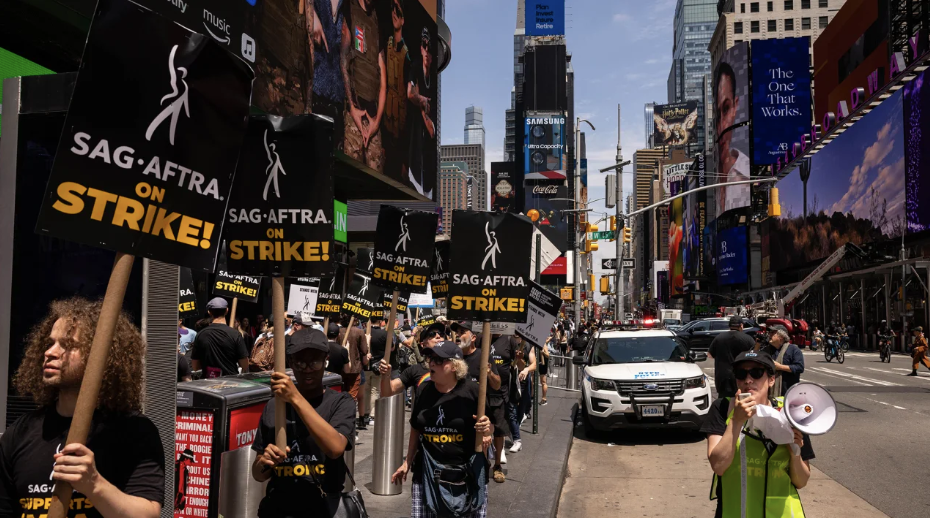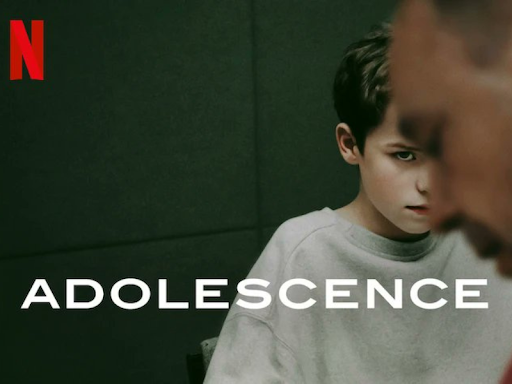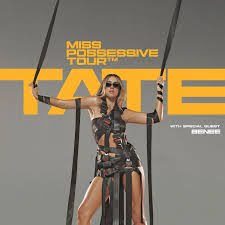On July 14, 2023, the Screen Actors Guild and American Federation of Television and Radio Artists (SAG-AFTRA) announced they were going on strike indefinitely. This action canceled the filming and press for all movies and TV shows run by major studios, leaving millions across the globe heartbroken. But what is the reason behind this strike?
The strike began during negotiations between SAG-AFTRA and the Alliance of Motion Picture and Television Producers (AMPTP), which includes major studios and companies such as MGM, Disney, Fox, Netflix, Paramount, Warner Bros., and many others. These negotiations occur every few years and usually include SAG-AFTRA presenting a list of demands for their re-negotiated contract, AMPTP presenting what they want, and the two sides coming to a compromise. This year, however, the Screen Actors Guild was dissatisfied with the compromises AMPTP was willing to make.
Much of this unhappiness stemmed from the financial part of the contract. According to Sagaftrastrike.org, the Screen Actors Guild asked for an 11% wage increase in order to recover from “record inflation” during the previous contract term. AMPTP would only grant 5%. The Screen Actors Guild retaliated by saying, “The companies represented by the Alliance of Motion Picture and Television Producers […] are committed to prioritizing shareholders and Wall Street,” and that these people were “rewarded for exploiting workers”. Not only did AMPTP refuse to increase wages to any significant extent, but they also refused to provide fair compensation for streaming revenue. In the past, TV and movie actors would be paid residuals from their shows or movies through reruns on cable television. Popular streaming services such as Netflix have completely changed how that system works. Residuals have declined drastically, and many actors have complained that they are not being fairly compensated for the profits streaming brings. This is especially important since residuals make up a huge portion of a Hollywood worker’s income, and without them, it can be difficult to make a living (Sagaftrastrike.org).
Another huge complaint was the use of AI by Hollywood studios. AMPTP had proposed using AI in order to reduce the work of background actors. The idea was that they would scan a background actor’s performance and then pay them for half a day’s labor. Later, they would be able to both use this performance to train AI systems and replicate it for other projects without the actor’s consent. SAG-AFTRA asked for more compensation for these actors, as well as informed consent for anything the studios wanted to do with these AI-generated performances. AMPTP refused (Sagaftrastrike.org).
Of course, actors are not the only group worried about the use of AI. About two months prior to the SAG strike, the Writer’s Guild of America (WGA) went on strike for similar reasons, including the use of AI to replicate scripts and screenplays created by actual writers. Fortunately, the WGA and AMPTP were able to settle on this issue. Other than studios trying to save money, not many people want AI-written movies and TV shows; after all, “AI writing is nowhere near as good as raw human emotion,” according to Ramapo junior, Madeline Klecha.
SAG-AFTRA and the WGA were on strike simultaneously for around three months during the summer and early fall of 2023. It was the first time both actors and writers have been on strike at the same time since 1960 (nbcnews.com). We saw the end of this recently, though, when on Tuesday, September 26, the WGA and AMPTP reached a “tentative agreement”, and officially ended the strike on September 27 (BBC). SAG-AFTRA shared their support for the WGA in an Instagram post, saying, “We look forward to reviewing the terms of the WGA and AMPTP’s tentative agreement. And we remain ready to resume our own negotiations with the AMPTP as soon as they are prepared to engage on our proposals in a meaningful way. Until then, we continue to stand strong and unified” (Instagram.com).
The Screen Actors Guild are not the only ones hoping for a fair deal and an end to the strike. The strike affected the filming and release of many anticipated projects. Of course shows and movies can air during the strike, but they risk doing badly since the nature of the strike includes a prohibition of any sort of press or promotion by actors. Movies such as the highly anticipated sequel to the popular sci-fi film, Dune, have had their release dates pushed back to the winter or spring. Many not directly involved in the strike have been hoping for an end. Ramapo English teacher, Mrs. Loccke, had the following to say: “I definitely want my favorite shows and new shows to continue! This is a conversation we should all be having because it affects so many areas of our lives.”
The strike had affected so many, both in and out of Hollywood, but we are beginning to see the light at the end of the tunnel. Shows that don’t require actors (talk shows, for example) are projected to start airing again; new shows are being announced, and SAG-AFTRA is rumored to start negotiations with AMPTP again soon. Overall, this strike has been long but necessary, and we will hopefully soon see a change in how major studios treat Hollywood workers.






